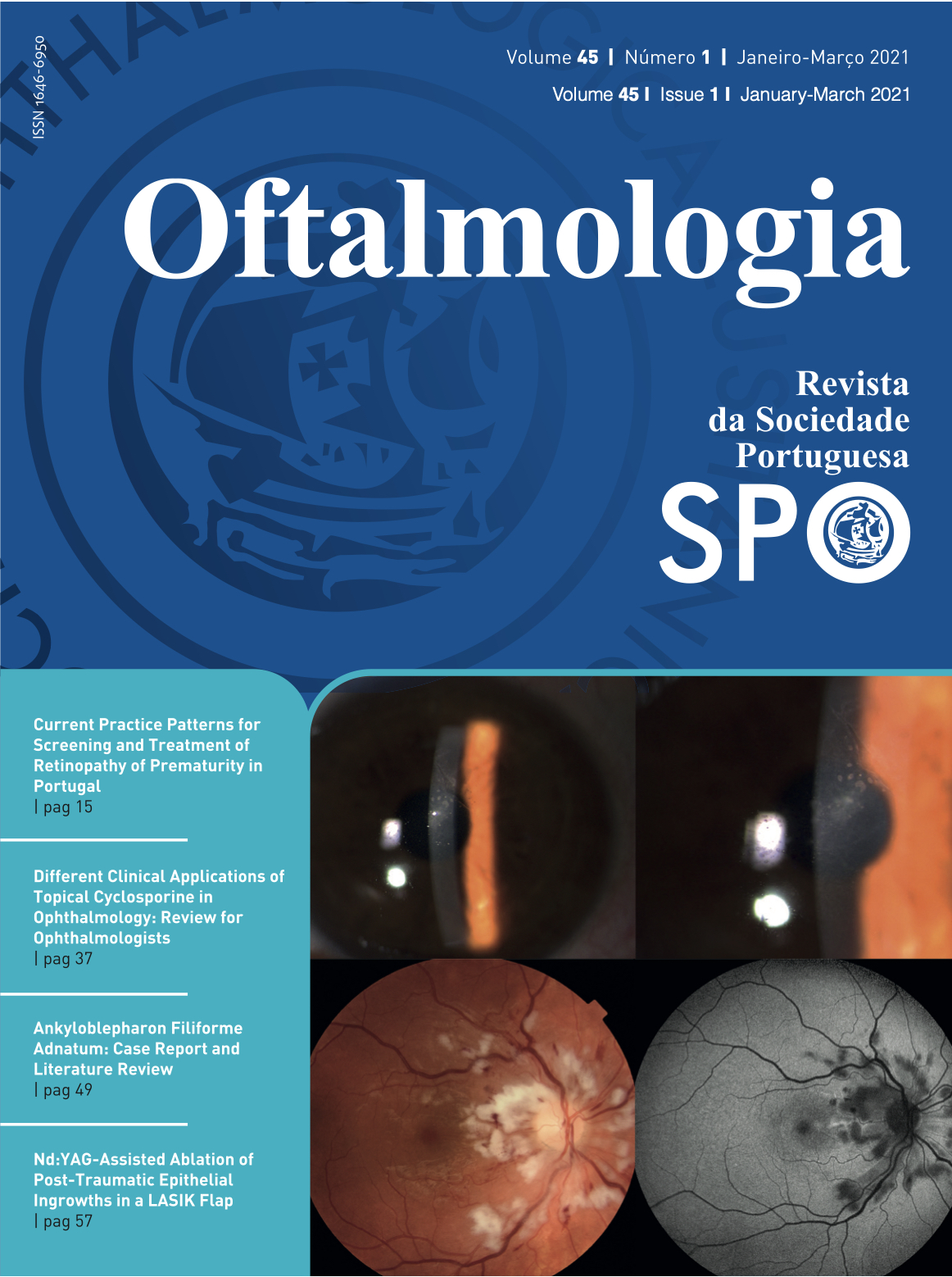Current practice patterns for screening and treatment of Retinopathy of Prematurity in Portugal
DOI:
https://doi.org/10.48560/rspo.21833Abstract
INTRODUCTION: The screening and treatment of retinopathy of prematurity (ROP) may vary significantly between providers. The aim of the study is to determine preferred practices in screening, diagnosis and treatment of ROP.
MATERIAL AND METHODS: Portuguese ophthalmologists that perform ROP screening were invited to complete an electronic anonymous questionnaire regarding screening, treatment and the use of telemedicine (n=26).
RESULTS:In 76.9% of the responders, ROP screening is made if ≤ 32 weeks of gestational age or ≤ 1500 g of birth weight or if > 32 weeks / > 1500 g with an unstable clinical state, starting at 4 weeks’ chronologic age or at a corrected gestational age of 31 weeks in 65.4%, using topical 2.5% phenylephrine + 0.5% tropicamide and binocular indirect ophthalmoscopy in 84.6%. After the diagnosis of type 1 ROP, 46.2% performed the treatment. The initial treatment for type 1 ROP was anti-VEGF intravitreal injection if ROP in zone I and laser photocoagulation if ROP zone II in 65.2%. No complications were reported in 72.2% of laser treatments and in 73.3% of anti-VEGF injections. The use of telemedicine for ROP screening is considered to be helpful by 88.5%.
CONCLUSION:Most Portuguese ophthalmologists use a more inclusive criteria of gestational age to screen ROP and mostly perform it with a binocular indirect ophthalmoscope. The treatment of choice for type 1 ROP is mostly dependent on the zone of ROP. Screening of ROP with teleme-dicine seems a reliable option for most ophthalmologists.
Downloads
References
Kim SJ, Port AD, Swan R, Campbell JP, Chan RVP, Chiang MF. Retinopathy of prematurity: a review of risk factors and their clinical significance. Surv Ophthalmol. 2018;63:618-37. doi:10.1016/j.survoph-thal.2018.04.002
World Health Organization. Library Cataloguing-in-Publication Data. Vision 2020 The Right to Sight Global Initiative for the Elimination of Avoidable Blindness Action Plan 2006-2011. Geneve: WHO; 2007.
Fierson WM. Screening examination of premature infants for retinopathy of prematurity. Pediatrics. 2013;131:189-95. doi:10.1542/peds.2012-2996
Lichtenstein SJ, Buckley EG, Ellis GS, et al. Screening examination of premature infants for retinopathy of Current Practice Patterns for Screening and Treatment of Retinopathy of Prematurity in Portugal prematurity. Pediatrics. 2006;117:572-6. doi:10.1542/peds.2005-2749
Garway-Heath DF, Crabb DP, Bunce C, Lascaratos G, Amalfitano F, Anand N, et al. Latanoprost for open-angle glaucoma (UKGTS): A randomised, multicen-tre, placebo-controlled trial. Lancet. 2015;385:1295-304.. doi:10.1016/S0140-6736(14)62111-5
Goodman MJ, Nordin JD, Harper P, Defor T, Zhou X. Erratum: The safety of trivalent influenza vaccination in healthy children aged 6 to 24 months. Pediatrics. 2006;118:1323-4. doi:10.1542/peds.2006-2006
Ahmed MAT, Duncan M, Kent A. Incidence of retino-pathy of prematurity requiring treatment in infants born greater than 30 weeks’ gestation and with a bir-thweight greater than 1250 g from 1998 to 2002: A re-gional study. J Paediatr Child Health. 2006;42:337-40. doi:10.1111/j.1440-1754.2006.00868.x
Comissão de Coordenação Programa Nacional para a Saúde da Visão. Boas práticas em oftalmologia 2008 – Elementos Clínicos de Avaliação e Referenciação. Lisboa: CCPNSV; 2008.
Henriques G, Brito C, Teixeira S. Consenso Clínico Retinopatia da prematuridade. Lisboa: Sociedade Portuguesa de Oftalmologia; 2014.
Binenbaum G. Algorithms for the Prediction of Retinopathy of Prematurity Based on Postnatal Weight Gain. Clin Perinatol. 2013;64:223-7. doi:10.1016/j.clp.2013.02.004
Early Treatment For Retinopathy Of Prematurity Coo-perative Group. Revised indications for the treatment of retinopathy of prematurity: results of the early tre-atment for retinopathy of prematurity randomized trial. Arch Ophthalmol. 2003;121:1684-94. doi: 10.1001/archopht.121.12.1684.
Hellström A, Hård AL, Engström E, Niklasson A, An-dersson E, Smith L, et al. Early weight gain predicts retinopathy in preterm infants: new, simple, efficient approach to screening. Pediatrics. 2009;123:e638-45. doi: 10.1542/peds.2008-2697.
Mota M, Coutinho I, Pedrosa C, et al. Relação entre a Progressão Ponderal dos Prematuros nas primeiras semanas de vida e o desenvolvimento de Retinopatia da Prematuridade Grave. Rev da Soc Port Oftalmol. 2017;41:43.
Malheiro L, Falcão I, Neiva L, Almeida A, Maia S, Miranda V, et al. Application of the WINROP model in Retinopathy of Prematurity (ROP) screening in a Portuguese cohort of premature infants. Rev Bras Oftalmol. 2019;78:30-6. doi:10.5935/0034-7280.20190007
Lorenz B, Spasovska K, Elflein H, Schneider N. Wide-field digital imaging based telemedicine for screening for acute retinopathy of prematurity (ROP). Six-year results of a multicentre field study. Graefe’s Arch Clin Exp Ophthalmol. 2009;247:1251-62. doi:10.1007/s00417-009-1077-7
Murakami Y, Silva RA, Jain A, Lad EM, Gandhi J, Moshfeghi DM. Stanford university network for diagnosis of retinopathy of prematurity (SUN-DROP): 24-month experience with telemedicine scre-ening. Acta Ophthalmol. 2010;88:317-22. doi:10.1111/j.1755-3768.2009.01715.x
Ng EYJ, Connolly BP, McNamara JA, Regillo CD, Van-der JF, Tasman W. A comparison of laser photocoagulation with cryotherapy for threshold retinopathy of prematurity at 10 years: Part 1. Visual function and structural outcome. Ophthalmology. 2002;109:928-34; discussion 935.. doi:10.1016/S0161-6420(01)01017-X
Houston SK, Wykoff CC, Berrocal AM, Hess DJ, Murray TG. Laser treatment for retinopathy of prematurity. Lasers Med Sci. 2013;28:683-92. doi:10.1007/s10103-011-1021-z
Hunter DG, Repka MX. Diode Laser Photocoagulation for Threshold Retinopathy of Prematurity: A Randomized Study. Ophthalmology. 1993;100:238-44.. doi:10.1016/S0161-6420(93)31664-7
Andersen C, Phelps D. Peripheral retinal ablation for threshold retinopathy of prematurity in preterm infants. Cochrane Database Syst Rev. 1999 :CD001693. doi:10.1002/14651858.cd001693
Sankar MJ, Sankar J, Chandra P. Anti-vascular endothelial growth factor (VEGF) drugs for treatment of retinopathy of prematurity. Cochrane Database Syst Rev. 2018 :CD009734. doi:10.1002/14651858.CD009734.
Good WV, Hardy RJ, Dobson V, Palmer EA, Phelps DL, Quintos M, et al; Early Treatment for Retinopathy of Prematurity Cooperative Group. The incidence and course of retinopathy of prematurity: findings from the early treatment for retinopathy of prematurity study. Pediatrics. 2005;116:15-23. doi: 10.1542/peds.2004-1413.
Mintz-Hittner HA, Kennedy KA, Chuang AZ. Efficacy of intravitreal bevacizumab for stage 3+ retinopathy of prematurity. N Engl J Med. 2011;364:603-15.. doi:10.1056/NEJMoa1007374
Kemper AR, Wallace DK. Neonatologists’ practices and experiences in arranging retinopathy of prematurity screening services. Pediatrics. 2007;120:527-31. doi:10.1542/peds.2007-0378
Wilkinson AR, Haines L, Head K, Fielder AR. UK retinopathy of prematurity guideline. Early Hum Dev. 2008;84:71-4. doi:10.1016/j.earlhumdev.2007.12.004
Kremer LJ, Reith DM, Medlicott N, Broadbent R. Systematic review of mydriatics used for screening of retinopathy in premature infants. BMJ Paediatr Open. 2019;3:e000448. doi:10.1136/bmjpo-2019-000448
Bremond-Gignac D, Jacqz-Aigrain E, Abdoul H, Daruich A, Beresniak A, Baud O, et al; on behalf of the CLAIR FO Study Group. Ophthalmic Insert versus Eye Drops for Mydriasis in Neonates: A Randomized Clinical Trial. Neonatology. 2019;115:142-8. doi: 10.1159/000493723.
Fouzdar Jain S, Song HH, Al-Holou SN, Morgan LA, Suh DW. Retinopathy of prematurity: Preferred practice patterns among pediatric ophthalmologists. Clin Ophthalmol. 2018;12:1003-9. doi:10.2147/OPTH.S161504
Agarwal-Sinha S, Amin S, Way A. Preferences and Trends in Practices Caring Premature Infants for Retinopathy of Prematurity (ROP): A Web-based Survey. Curr Trends Ophthalmol. 2018;1:49-61. doi:10.18314/ctoy.v1i1.1247
Ells AL, Holmes JM, Astle WF, Williams G, Leske DA, Fielden M, et al. Telemedicine approach to screening for severe retinopathy of prematurity: a pilot study. Ophthalmology. 2003;110:2113-7. doi: 10.1016/S0161-6420(03)00831-5.
Capone A, Ells A, Balasubramanian M. The photographic screening for retinopathy of prematurity study (PHOTO-ROP): Primary outcomes. Retina. 2008;28:S47-54. doi:10.1097/IAE.0b013e31815e987f
Chiang MF, Melia M, Buffenn AN, Lambert SR, Recchia FM, Simpson JL, et al. Detection of clinically significant retinopathy of prematurity using wide-angle digital retinal photography: a report by the American Academy of Ophthalmology. Ophthalmology. 2012;119:1272-80. doi: 10.1016/j.ophtha.2012.01.002.
Slidsborg C, Forman JL, Fielder AR, Crafoord S, Baggesen K, Bangsgaard R, et al. Experts do not agree when to treat retinopathy of prematurity based on plus disease. Br J Ophthalmol. 2012;96:549-53. doi: 10.1136/bjophthalmol-2011-300573
Downloads
Published
How to Cite
Issue
Section
License
Do not forget to download the Authorship responsibility statement/Authorization for Publication and Conflict of Interest.
The article can only be submitted with these two documents.
To obtain the Authorship responsibility statement/Authorization for Publication file, click here.
To obtain the Conflict of Interest file (ICMJE template), click here





